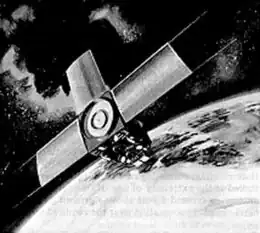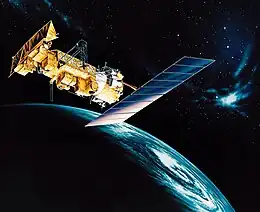 Illustration of an ITOS series satellite | |
| Mission type | Weather |
|---|---|
| Operator | NOAA / NASA |
| COSPAR ID | 1973-086A[1] |
| SATCAT no. | 6920 |
| Spacecraft properties | |
| Manufacturer | RCA Astrospace |
| Launch mass | 746 kilograms (1,645 lb) |
| Start of mission | |
| Launch date | November 6, 1973, 17:02 UTC |
| Rocket | Delta-300 |
| Launch site | Vandenberg SLC-2W |
| End of mission | |
| Deactivated | August 1976 |
| Orbital parameters | |
| Reference system | Geocentric |
| Regime | Low Earth Sun-synchronous |
| Perigee altitude | 1,500 kilometers (930 mi) |
| Apogee altitude | 1,509 kilometers (938 mi) |
| Inclination | 102.1° |
| Period | 116.11 minutes |
| Epoch | November 6, 1973 |
ITOS | |
NOAA-3, also known as ITOS-F was a weather satellite operated by the National Oceanic and Atmospheric Administration (NOAA). It was part of a series of satellites called ITOS, or improved TIROS.[2] It was deactivated by NOAA in August 1976.
References
- ↑ "NASA/NSSDC NOAA-3 spacecraft details". Retrieved June 7, 2018.
- ↑ Wade, Mark. "ITOS". Encyclopedia Astronautica. Archived from the original on June 21, 2002. Retrieved June 6, 2018.
External links
This article is issued from Wikipedia. The text is licensed under Creative Commons - Attribution - Sharealike. Additional terms may apply for the media files.
